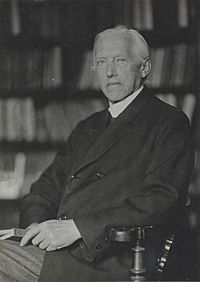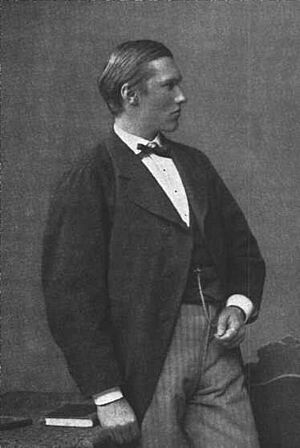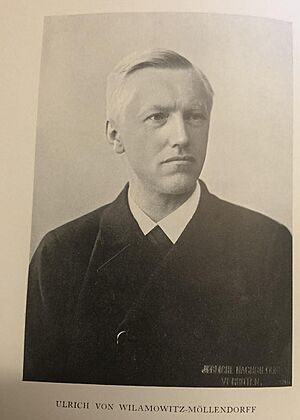Ulrich von Wilamowitz-Moellendorff facts for kids
Quick facts for kids
Ulrich von Wilamowitz-Moellendorff
|
|
|---|---|
 |
|
| Born |
Enno Friedrich Wichard Ulrich von Wilamowitz-Moellendorff
22 December 1848 |
| Died | 25 September 1931 (aged 82) |
| Nationality | Prussian, German |
| Education | Schulpforta |
| Alma mater | University of Bonn |
| Scientific career | |
| Fields | Classical philology |
| Academic advisors | Otto Jahn, Hermann Usener, Anton Springer |
| Notable students | Jacoby, Bosch i Gimpera, H. Fränkel, Schadewaldt, E. Fraenkel, Jaeger, Maas, Schwartz, Murray, Friedländer, Kranz, Pasquali, Cherniss |
Ulrich von Wilamowitz-Moellendorff (born December 22, 1848 – died September 25, 1931) was a German expert in classical philology. This field is the study of ancient languages, literature, and cultures. Wilamowitz, as he was known, was a famous authority on Ancient Greece and its writings. He made many important contributions to understanding the ancient world.
Contents
Life Story
Early Years
Ulrich von Wilamowitz-Moellendorff was born in Markowitz (now Markowice), a small village in what was then Prussia. His family was German, with some distant Polish roots. His father, Arnold Wilamowitz, was a Prussian Junker, which means he was a noble landowner. His mother was Ulrika. The family lived in a small manor. In 1813, the "von Moellendorf" part of their name was added when a Prussian field marshal adopted Ulrich's ancestors. Ulrich was the third child and grew up in East Prussia.
In 1867, he finished his high school education, called Abitur, at the well-known boarding school in Schulpforta.
University Studies
From 1867 to 1869, Wilamowitz studied classical philology at the University of Bonn. His teachers, Otto Jahn and Hermann Usener, greatly influenced him. He had a difficult relationship with Usener. He also became lifelong rivals with his fellow student Friedrich Nietzsche. However, he formed a close friendship with Hermann Diels.
In 1869, Wilamowitz and Diels moved to Berlin. There, in 1870, he earned his Doctor of Philosophy degree with high honors. After serving briefly in the Franco-Prussian War, he traveled to Italy and Greece to continue his studies.
Debate with Nietzsche
Before he became a professor, Wilamowitz was part of a big academic debate. This argument was about Friedrich Nietzsche's book, Birth of Tragedy. In 1872–73, Wilamowitz wrote two strong articles that criticized Nietzsche and another professor, Erwin Rohde. Richard Wagner, a famous composer, supported Nietzsche.
The main issue was Nietzsche's criticism of Euripides, an ancient Greek playwright. Nietzsche believed Euripides had harmed Greek tragedy. Wilamowitz saw Nietzsche's ideas as an attack on how scholars should study things scientifically. He argued that Nietzsche was against the scientific method. This debate was seen as the classical philology field's response to Nietzsche's challenge.
Years later, when Wilamowitz wrote his memoirs at age 80, he still stood by his main points from this debate.
Teaching Career
Greifswald University
In 1875, Wilamowitz became a professor after publishing his study Analecta Euripidea. The next year, he became a full professor of Classical Philology at the University of Greifswald. During this time, he married Marie Mommsen, whose father was the famous historian Theodor Mommsen. He also published his book Homeric Studies.
Göttingen University
In 1883, he moved to the University of Göttingen to take another professorship. He continued to teach classical philology and also gave lectures on Ancient History. He helped his colleague, Julius Wellhausen, get a job in Göttingen too. In 1891, he became the university's vice-chancellor. A year later, he joined Göttingen's Royal Academy of Sciences.
Berlin University
In 1897, with help from his friend Diels, Wilamowitz was offered a position at the Royal Friedrich-Wilhelms-Universität in Berlin. He stayed there until he retired in 1921. In 1915, he was the university's chancellor for a year. He and Diels also started the Berlin Institute for Ancient Studies in 1897. His public lectures on Classical antiquity were very popular and attracted many people.
Academic Work and Memberships
In 1891, Wilamowitz became a member of the Prussian Academy of Sciences. He became its president in 1902. As a member of the Göttingen academy, he strongly supported the creation of the Thesaurus Linguae Latinae, a huge dictionary of Latin. He also worked on a commission for Patristics, which is the study of early Christian writers. In 1894, he joined the German Archaeological Institute. He also edited a series of scholarly works called Philologische Untersuchungen.
Wilamowitz was also a guest lecturer in Oxford (1908) and Uppsala (1912). He was a member of several other academic societies in Norway and Sweden.
Inscriptiones Graecae
While he was president of the Prussian Academy, Wilamowitz oversaw the continuation of the Inscriptiones Graecae series. This project collects and publishes ancient Greek inscriptions. Wilamowitz had a big impact on this project and directed it until he died.
World War I
Wilamowitz was one of the people who started a document called "Declaration by the University Teachers of the German Reich." In this document, over 3,000 university teachers supported Germany's involvement in World War I. He also signed another document called the Manifesto of the Ninety-Three, but he later said he regretted signing it. In 1914, his son, Tycho, who was also a classical philologist, died in battle.
Family Life
In 1878, Wilamowitz married Maria Mommsen. She was the oldest daughter of the famous ancient historian, Theodor Mommsen. Wilamowitz helped his father-in-law finish his important book, Roman History.
Wilamowitz spent his last years quietly, suffering from kidney problems. He passed away in Berlin on September 25, 1931, after a short coma. He is buried in his hometown, Markowice, with his wife, Maria, and their son, Tycho. He also had a daughter, Dorothea.
Main Achievements
Wilamowitz is considered one of the most important figures in classical philology from the late 1800s and early 1900s. He was a great expert on the literature and history of Ancient Greece. He challenged old ways of studying texts and focused on finding information about authors from their writings. He used historical knowledge to help understand ancient texts better.
Besides his major works like Greek Literature from Antiquity and Hellenistic Poetry, he published many detailed studies. These focused on important ancient writers such as Euripides, Homer, Aeschylus, Pindar, and Aristotle. As an organizer of academic projects, he was also responsible for publishing important source materials, like the Inscriptiones Graecae.
He also strongly supported keeping classical education in German schools. Many notable scholars were his students, including Felix Jacoby, Werner Jaeger, and Gilbert Murray.
Honours and Awards
- 1910: Honorary doctorate in Theology from the University of Berlin
- 1911: Honorary doctorate from Oslo University
- Pour le Mérite for Arts and Sciences, 1908
Works
- Griechische Literatur des Altertums (Greek Literature from Antiquity)
- Einleitung in die griechische Tragödie (Introduction to Greek Tragedy)
- Homerische Untersuchungen (Homeric Studies) (1884)
- Die Ilias und Homer (The Iliad and Homer) (1916)
- Platon (Plato) (1919)
- Hellenistische Dichtung (Hellenistic Poetry) (1924)
- Erinnerungen 1848–1914. (Memoirs) (1928)
See also
 In Spanish: Ulrich von Wilamowitz-Moellendorff para niños
In Spanish: Ulrich von Wilamowitz-Moellendorff para niños
 | Janet Taylor Pickett |
 | Synthia Saint James |
 | Howardena Pindell |
 | Faith Ringgold |



